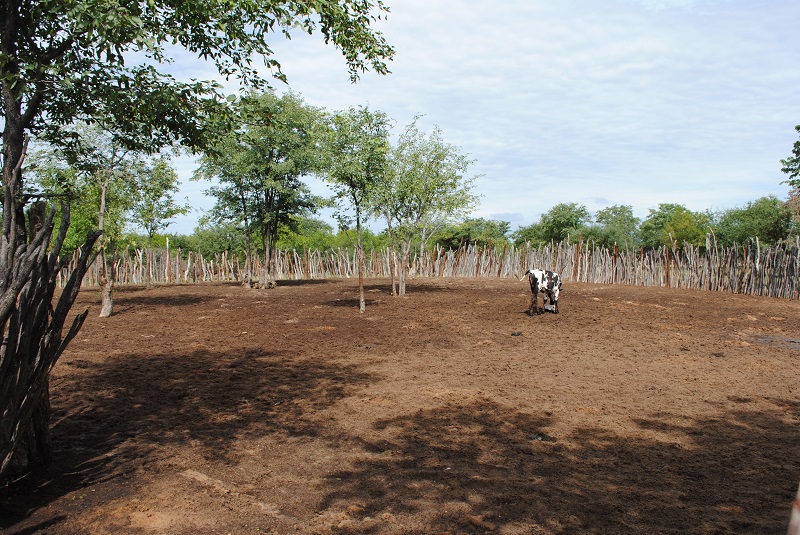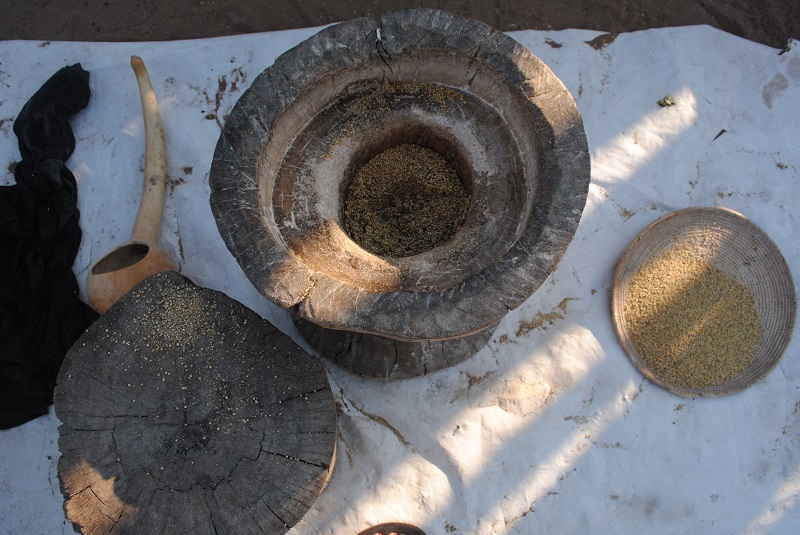Why reflect? Because it opens the door to rich learning on climate action
Why reflect? Because it opens the door to rich learning on climate action
Lucia Scodanibbio describes CDKN's recent efforts to learn with its partners in Namibia about effective 'climate knowledge brokering', a concept explained further in this blog. With contributions from Margaret Angula, Amanda April, Emma Baker, Ester Nangolo, Bernadette Shalumbu and Cecil Togarepi.
When we are immersed in project activities, we seldom set aside the time to stop and reflect on whether we are still working towards achieving the objectives we initially set out; whether those are still relevant and appropriate; or how we could work more effectively in pursuing those aims. Short projects – such as those under three years – struggle to build in moments for reflection and learning, as partners work round the clock to deliver the outputs and outcomes they committed to.
The second phase of CDKN, however, has intentionally allocated resources to reflect on its work thus far. We are reflecting particularly about the important knowledge brokering roles played by CDKN’s diverse partners.
Whether translating knowledge to make it more accessible (such as the recent CDKN guides to the latest IPCC Special Reports) or facilitating opportunities for stakeholders to learn from each other, it is crucial to develop occasions to step back and consider the lessons learned.
Reflecting can shed light on whether our activities are contributing to the programme’s intended impacts, and what we are learning about the use of different approaches and tools, challenges faced, and competencies required to navigate those. To this end, CDKN has started collecting a number of cases from which we can learn about knowledge brokering in the global South. One of these case studies is from Namibia and is described here.
What is knowledge brokering?
Knowledge brokering comprises a wide set of activities that range across:
- enabling access to information
- tailoring and translating knowledge
- facilitating processes that co-produce knowledge or help in its understanding (e.g. peer-to-peer learning)
- seeking to bridge social and institutional divides, to result in innovation and action on the ground.
Clearly, many opportunities and challenges are encountered across this spectrum of activities, such as how to make knowledge relevant and legitimate, how to navigate political and institutional landscapes, or how to take into account stakeholders' different values and motivations, or the rules they must follow.
To overcome these challenges, knowledge brokers need a diverse set of skills, strategies and tools that can help them to seize opportunities that can contribute to facilitating change and getting knowledge into action.
Facilitating a reflection process in Namibia
In Namibia, CDKN is partnering with the University of Namibia and a diverse set of actors from the governmental and non-governmental sectors, to mainstream gender-responsive climate actions into rural development.
Vulnerability risk assessments - one of the main tools the team is using - aim to identify who is most vulnerable to climate change impacts such as drought and how. This information is used to create effective climate change adaptation plans. This initiative builds on the work of the Adaptation at Scale in Semi-Arid Regions (ASSAR) project, which ran from 2014-2018.
In early March 2020, the core CDKN project team came together to reflect on its activities, strategies and critical turning points, between 2014 and now. Through animated discussions over the course of three days, the team started by elaborating what they considered to be their most significant achievements to date.
These achievements included, for example, an increased sense of partnership between the project team and the regional government in implementing climate-resilient development. From there, as if on a magic time machine, we travelled along a six-year timeline which visited significant events that contributed to those changes. We recalled our attendance at community-level workshops in Omusati that enabled critical relationships to be forged; training workshops that strengthened influencing and networking skills; high-level events (such as the Africa Drought Conference in Windhoek or COP24 in Katowice) where serendipitous exchanges paved the way for what turned out to be momentous project developments thereafter.
“I would say the workshop was reflective in that we had to reflect on activities that we are no longer involved in and it was easier to talk about them critically as we used a bird's eye view on what happened, why we did certain activities and whether they worked or not. We could also trace the events and link them to what is happening now in other projects as a result of experiences of the ASSAR project”, said Cecil Togarepi from the University of Namibia.
As the team debated about the significance of different activities, filled in gaps and reminded each other of events or moments that eluded others’ memories, frantic notes captured the richness of details, while what appeared to be repetitive, tedious questions, sought to dig under the surface, to reach those more impenetrable lessons about why something did or did not work, and the possible reasons.
As the backbone for our discussions, we also explored what we understand about the role of ‘knowledge brokers’, the different tools and strategies they use, and the opportunities they harness and barriers they face in the process of getting knowledge into action.
The method was ‘insightful’ and an ‘eye opener’, according to participant Margaret Angula of the University of Namibia, who came to recognise that she has been using knowledge brokering techniques since 2015: “Now that I am fully aware of knowledge brokering, I will up it a notch because influencing policy for climate action is an emergency”, reflected Ms Angula at the end of the workshop.
Stopping to take stock of all the different activities that the team undertook provided an occasion to “analyse just how much we had achieved with ASSAR, how we identified various windows of opportunity to build on it, and reflect on what did not work and how to avoid or minimise forecasted challenges going forward”, added Bernadette Shalumbu, in charge of research uptake for ASSAR and CDKN at the Desert Research Foundation of Namibia.
Assessing the different strategies used and realising just how much the team learned over time about how to better understand and thus work more effectively within the political landscape at national and local level empowered the workshop participants.
“The lesson I would highlight is the power of influence,” said Ester Nangolo. “For example, at the ASSAR national feedback event we realised that it didn’t work for the University of Namibia Vice Chancellor to invite high-level political people. Instead, they should have been invited through the office of the Prime Minister. I will carry such examples to CDKN and other projects I will be involved in. It was also amazing to see the connection between a series of events, how one leads to the other.”
 Overall, the workshop was extremely productive, as much as it was intense and tiring! Everyone treasured the luxury of being able to sum up the lessons that emerged from the five-year ASSAR project and how those continue to shape – one could say nearly subconsciously up to now – the current CDKN project, and others that are in the funding pipeline. The team also realised just how important funders’ flexibility is in enabling them to respond to windows of opportunity, change strategy and go back to fill gaps and respond to needs, as these become more obvious.
Overall, the workshop was extremely productive, as much as it was intense and tiring! Everyone treasured the luxury of being able to sum up the lessons that emerged from the five-year ASSAR project and how those continue to shape – one could say nearly subconsciously up to now – the current CDKN project, and others that are in the funding pipeline. The team also realised just how important funders’ flexibility is in enabling them to respond to windows of opportunity, change strategy and go back to fill gaps and respond to needs, as these become more obvious.
I could go on to relay so many more lessons that emerged from the three days, but for that, another blog will be necessary.
The next steps will be to analyse the rich data collected; triangulate with different stakeholders to test some of the claims, assumptions and lessons; and feed back to a wider audience that is seeking, alongside us, to understand knowledge brokering in Namibia and more broadly in developing countries.
All images: Namibian landscapes, credit CDKN

